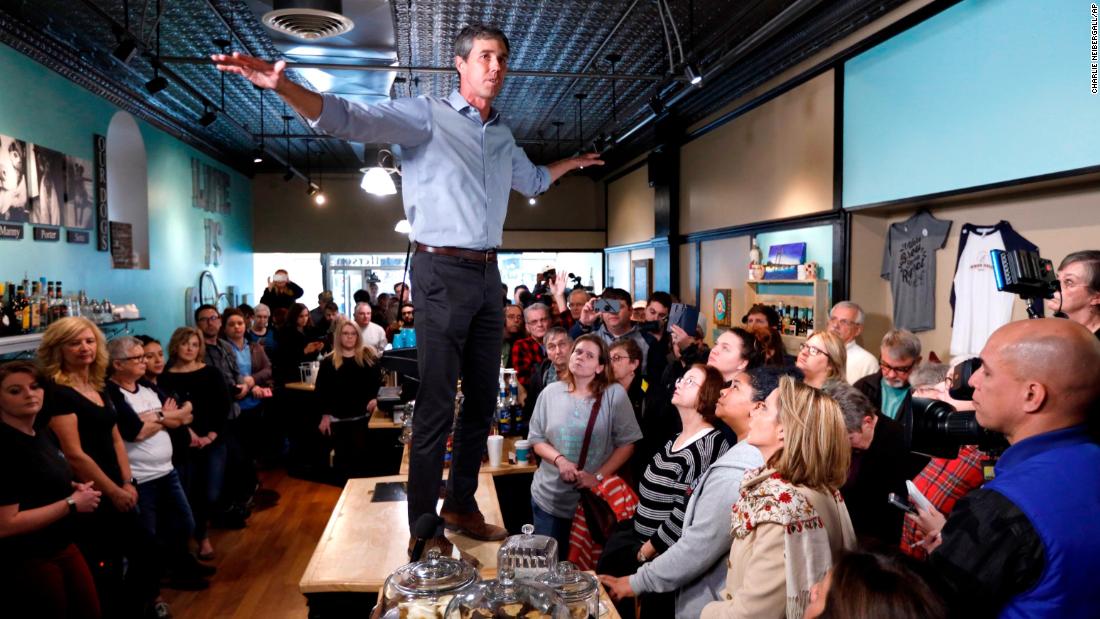[ad_1]
A CNN KFile review of interviews, debates, newspaper articles and ads from O’Rourke’s 2012 race reveals more about his past views and beliefs as he seeks the Democratic nomination in 2020.
O’Rourke at the time endorsed cuts to defense and domestic spending in the middle and long term, along with seriously considering changes to Social Security and tax laws that would do away with some tax breaks. Those past positions are at odds with the current and more progressive liberal base of the party that has largely embraced increased government programs like cost-free college and “Medicare for All.”
The deficit and debt became a lightning rod in the race in which O’Rourke, who had just left the El Paso city council, unseated eight-term incumbent Rep. Silvestre Reyes in the Democratic primary for Texas’s 16th district. Republicans, who controlled the House of Representatives at the time in the summer of 2011, had demanded a deficit reduction plan from then-President Barack Obama in exchange for raising the debt ceiling.
Chris Evans, O’Rourke’s campaign spokesman, said O’Rourke opposed efforts in Congress to increase the retirement age.
“On Social Security, Beto was acknowledging that it’s very possible Congress would look at that debate around raising the age in the future. He does not say he supports it or recommends it. Beto was interested in looking at possible ideas for ensuring the solvency of Social Security for future generations,” Evans told CNN in an email . “He ultimately found a solution that he endorsed and co-sponsored called the Social Security 2100 Act, which extends the solvency of the program without raising the retirement age. While Beto has not taken any action to raise the retirement age, he has opposed efforts to raise the retirement age and voted against measures to privatize Social Security.”
During the 2012 race, O’Rourke attacked Reyes for his failure to vote for the Budget Reform Act of 2011, which created a super committee to develop a deficit reduction plan.
Reyes subsequently ran ads criticizing O’Rourke, saying he wanted to cut Social Security.
A 2012 campaign fiscal fight
O’Rourke attacked Reyes on the issue during public debates, like one in November 2011, during which he lambasted Reyes for not getting specific on what areas he would cut.
“Those are the kinds of tough decisions that we send him, and our next congressman up to Washington, D.C., to make,” he added. “Those are the kinds of tough decisions that I made as city council representative, who was part of passing a balanced budget every single year. That means that we had to look at where the revenues were coming in from. That means we had to look at what programs we were going to cut and what programs we’re going to keep.”
O’Rourke raised cutting military spending and bringing troops home from Afghanistan, but also singled out Social Security as an area for reform, specifically citing means-testing and extending the retirement age.
“Social Security, the people who paid into social security and who are earning their checks back from investment in social security, that needs to be protected. That’s inviolable. But going forward for future generations, for my kids’ generation, five, three, and one year old. Right now, we need to look at things like means testing,” O’Rourke said.
He continued, “We need to look at perhaps a longer a later age at which my kids are going to retire. That’s a tough decision. It’s not easy to say it’s going to be politicized by my opponent, but those are the tough things that you’re going to want me to weigh in on when I’m in Washington, DC.”
Speaking at a March 2012 primary debate, O’Rourke said the US didn’t have a choice but to cut spending to avoid ruin.
In an interview available on YouTube from October 2011, O’Rourke said, though short-term spending was needed to help the economy, in the long-term cuts were important for fiscal sustainability, calling the US government extravagant.
Simpson-Bowles
“Long term and middle term, you have to have a plan to address that debt but that’s a plan that extends from —- to 2035, 55 and 75,” he said. “We look at the Simpson-Bowles Commission that is comprehensively taking a look at all of these issues and offering up some tough choices that Congress at some point is going to have to make or we can continue to look the other way and just say, you know what? It sucks, but I’m going to let my kids pick up the mess. I’m not willing to do that.”
O’Rourke didn’t abandon his rhetoric after beating Reyes in the May primary with just more than 50% of the vote and avoiding a runoff.
Speaking with the El Paso Times in October 2012, O’Rourke said addressing the national debt would require “painful medicine” that included “significant” increases to taxes and spending.
“It will require significant cuts and tax increases,” O’Rourke said. “And I’d be looking at every single exception in the tax code. It doesn’t do any good to trick someone. You have to be true to your word. If you aren’t that way, they’ll remember you. It’s better to be honest and direct.”
O’Rourke went on to defeat his Republican opponent that November, winning with 65% of the vote to start the first of his three terms in the House before running for US Senate in 2018.
[ad_2]
Source link

